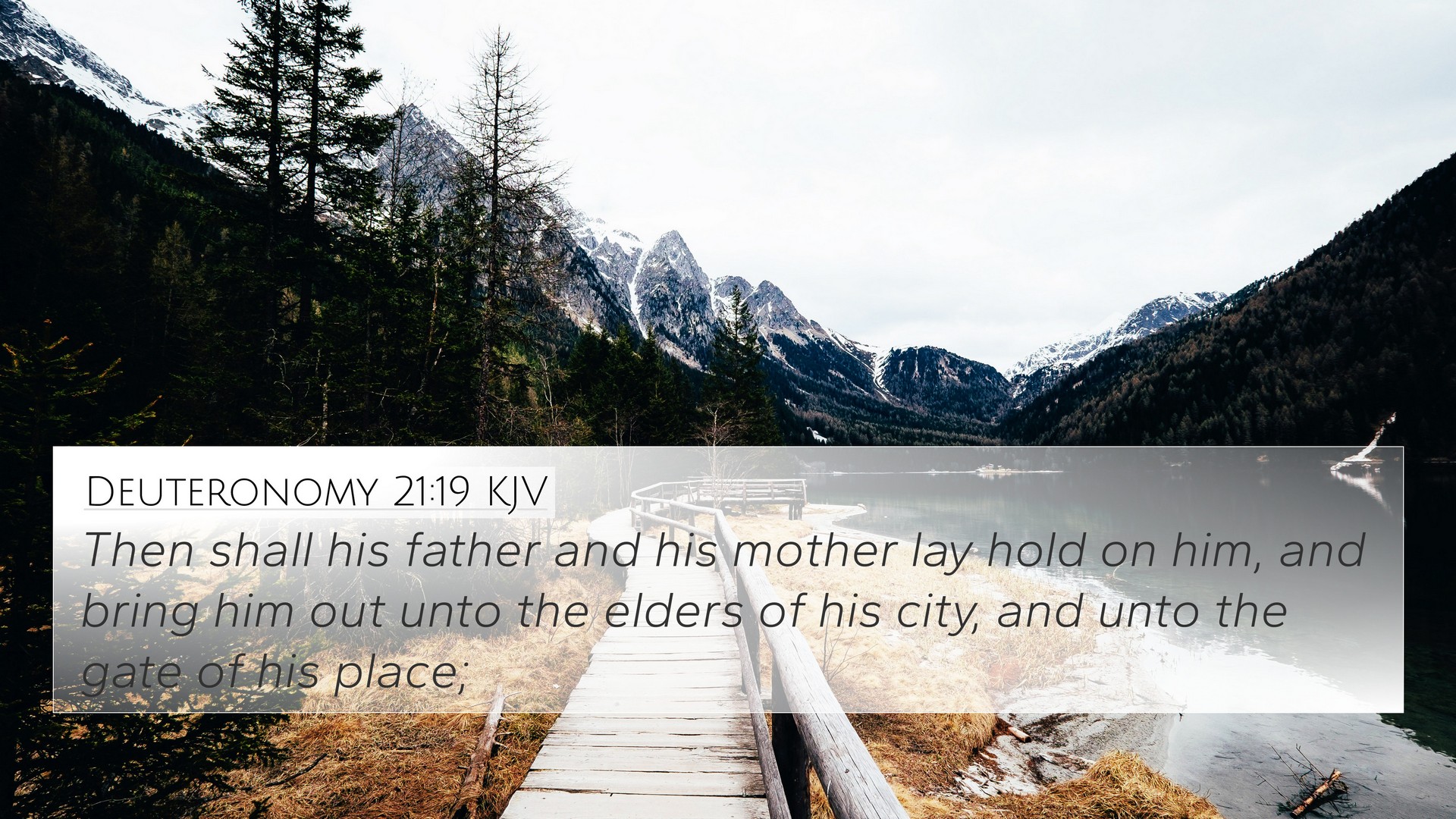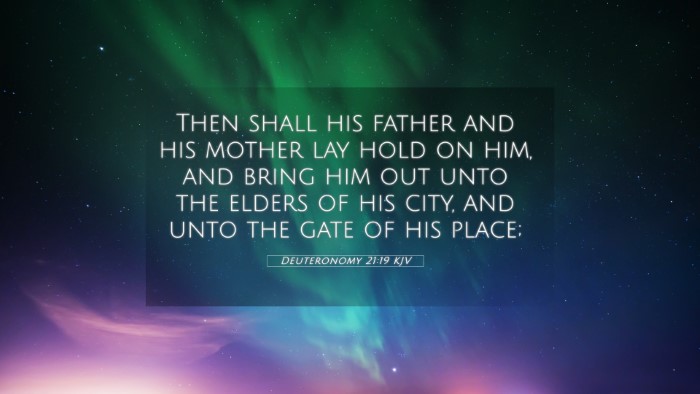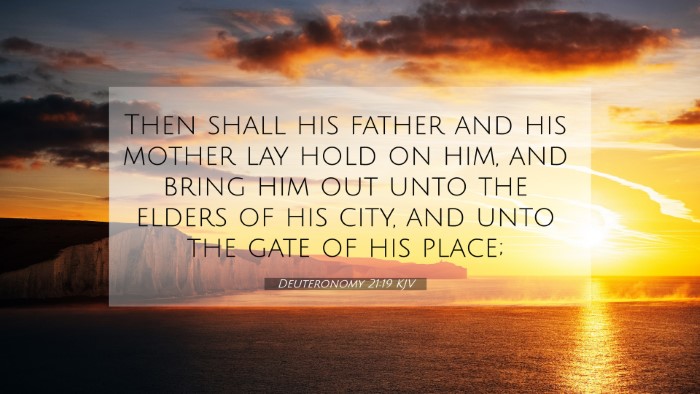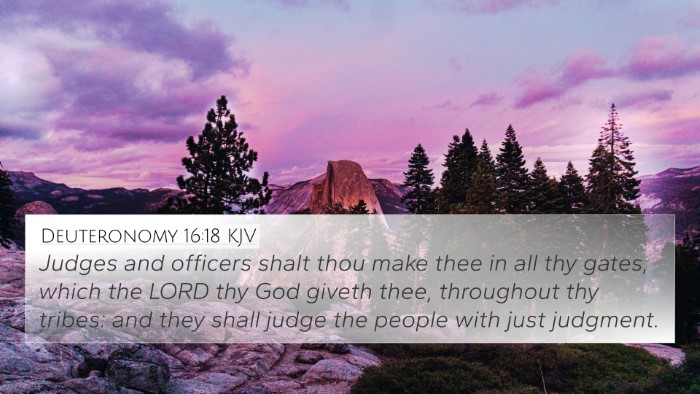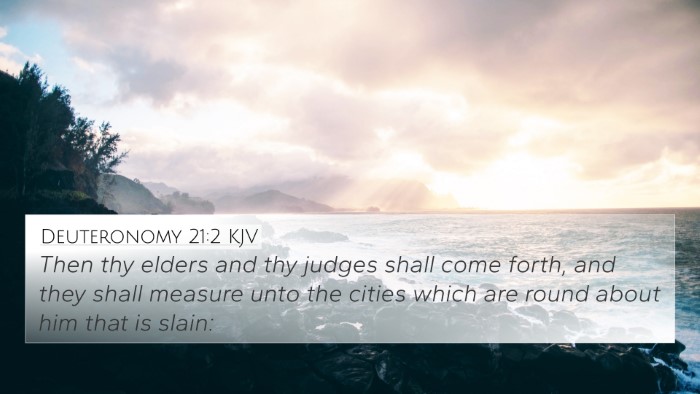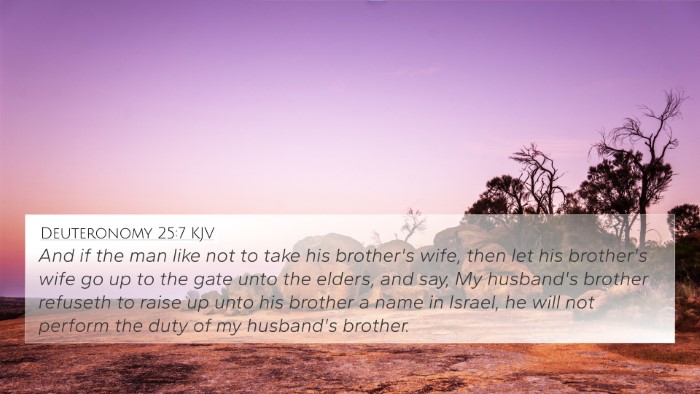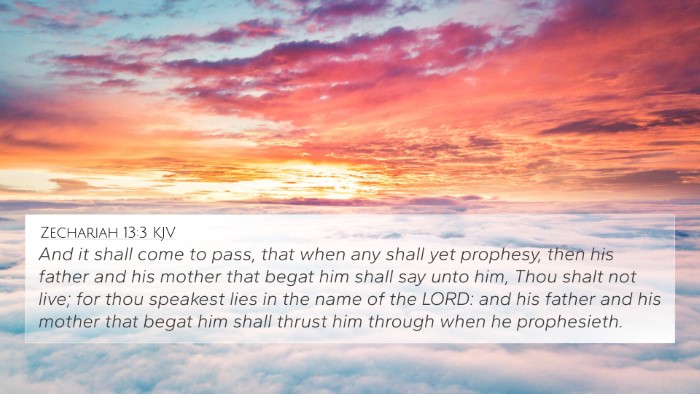Bible Verse Meaning: Deuteronomy 21:19
Deuteronomy 21:19 states:
"Then shall his father and his mother lay hold on him, and bring him out unto the elders of his city, and unto the gate of his place."
This verse addresses a specific situation concerning a rebellious child and outlines the procedure for the parents to bring their wayward son before the elders of the city. The context involves deep cultural significance and legal implications within the Old Testament law.
Contextual Analysis
To understand Deuteronomy 21:19, it is crucial to explore its legal and moral implications within Israelite society. Matthew Henry notes that the law here indicates a serious community concern regarding the behavior of children, emphasizing that discipline and correction were communal responsibilities, not just parental.
Thematic Significance
- Parental Responsibility: The verse highlights the vital role parents play in seeking communal support for addressing a child's disobedience.
- Community Involvement: It details how society should handle situations of rebellion—highlighting the collaborative nature of justice in Israel.
- Consequences of Rebellion: The drastic measures reflect the grave consequences of not adhering to societal norms, which could undermine the community's stability.
Cross-References and Thematic Connections
Deuteronomy 21:19 is intricately linked with several passages in the Bible that address similar themes:
- Exodus 20:12: "Honor your father and your mother, that your days may be long upon the land which the Lord your God is giving you." This sets the foundational expectation for child-parent relationships.
- Proverbs 13:24: "He who spares his rod hates his son, but he who loves him disciplines him promptly." This highlights the importance of discipline.
- Proverbs 29:15: "The rod and rebuke give wisdom, but a child left undisciplined brings shame to his mother." Again reinforcing the theme of discipline.
- Luke 15:11-24: The Parable of the Prodigal Son showcases the struggle of rebellion and the process of returning to the father—a New Testament reflection on the same theme of rebellion against parents.
- Colossians 3:20: "Children, obey your parents in all things, for this is well pleasing to the Lord." This instruction reaffirms the Old Testament command within a New Testament context.
- Numbers 15:30: Addresses the severity of sinning defiantly against the Lord, illustrating how rebellion affects one’s relationship with community and God.
- Ephesians 6:1: "Children, obey your parents in the Lord, for this is right." Continuing the exhortation for children to respect parental authority.
- Romans 1:30: Speaks about the consequences of societal rebellion and the nature of unrestrained disobedience, connecting back to the implications of Deuteronomy 21:19.
- 1 Samuel 3:13: God rebukes Eli for the reckless behavior of his sons, demonstrating that failing to correct rebelliousness can have serious spiritual consequences.
- Hebrews 12:11: "Now no chastening seems to be joyful for the present, but painful; nevertheless, afterward, it yields the peaceable fruit of righteousness to those who have been trained by it." This illustrates the purpose of discipline.
Interpretative Insights
Adam Clarke provides deeper insights into the cultural significance of this law, noting that it serves as a warning against moral decay within families. Rebellion not only disrupts familial harmony but also poses a threat to the societal order that relies on mutual respect. The act of bringing the child before the elders is not merely punitive; it is a solemn recognition of communal dignity and integrity.
Comparative Bible Verse Analysis
When conducting a comparative Bible verse analysis, one can see a thread that connects the themes of rebellion and discipline across the Old and New Testaments. Both Matthew Henry and Albert Barnes emphasize that the disciplinary actions prescribed reflect God's standards for His people and the seriousness of disobedience.
Conclusion
Deuteronomy 21:19 teaches us about the importance of discipline, community, and the responsibilities of parents and society as a whole. The connections drawn through scriptural cross-referencing reveal a cohesive biblical narrative focused on the values of obedience, respect, and communal harmony. For anyone studying the Bible, utilizing tools for Bible cross-referencing can greatly enhance understanding thematic Bible verse connections and support a deeper grasp of scriptural principles.
Understanding this verse in context, alongside its parallel verses and related themes across Scripture, equips the reader with essential insights into the workings of discipline within both familial and societal spheres.
